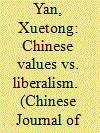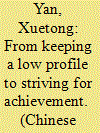|
|
|
Sort Order |
|
|
|
Items / Page
|
|
|
|
|
|
|
| Srl | Item |
| 1 |
ID:
158256


|
|
|
|
|
| Summary/Abstract |
The liberal hegemony of the United States is fading and faces the growing challenges from other ideologies including those from China. The question is which Chinese political values will guide China’s policies in shaping the future international normative order. There are three political values compete with each other in China, Marxism, economic pragmatism, and Chinese traditional values. The Chinese government tries to combine Marxism with Chinese traditional values. Such effort, however, may find its difficulties in achieving the assigned targets. Although the US liberalism is losing influence, it is still the most influential global ideology and will not be abandoned overnight. China may find that it is possible to shape the international order by combining some Chinese traditional values with selected liberalist values, such as benevolence, righteousness and rites with equality, democracy and freedom, respectively. The combination can produce a set of modern values of wangdao (humane authority), such as fairness, justice, and civility. The new norms under the guidance of these values could be acceptable to most countries because of their universality, and will bring about a more peaceful international order than what we have today.
|
|
|
|
|
|
|
|
|
|
|
|
|
|
|
|
| 2 |
ID:
131996


|
|
|
|
|
| Publication |
2014.
|
| Summary/Abstract |
Since 2012, some scholars, both Chinese and foreign, have argued that China's assertive foreign policy is doomed to fail. Nevertheless, after examining China's foreign relations in the last two years, this paper finds that China has experienced improved relations rather than deteriorating ones. In comparison with the strategy of keeping a low profile (KLP), the strategy of striving for achievement (SFA) shows more efficiency in shaping a favorable environment for China's national rejuvenation. The author applies the theory of moral realism to explaining the role of the SFA strategy and argues that morality can increase both international political strength and the political legitimacy of a rising power. The key difference between the KLP and the SFA is that the former focuses on economic gains and the latter seeks to strengthen political support. That is the reason that the SFA values the role of morality and the KLP does not. Due to these different goals, the SFA strategy differs from the KLP strategy in aspects of tenets, general layouts, working approaches, and methods. So far, the SFA has achieved progress beyond people's expectation from Xi Jinping in 2012. Xi's strong leadership may become a new case suitable for illustrating the theory of moral realism.
|
|
|
|
|
|
|
|
|
|
|
|
|
|
|
|
|
|
|
|
|